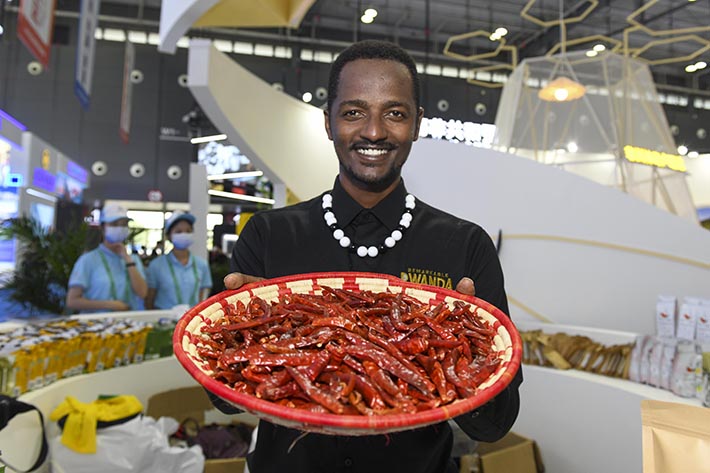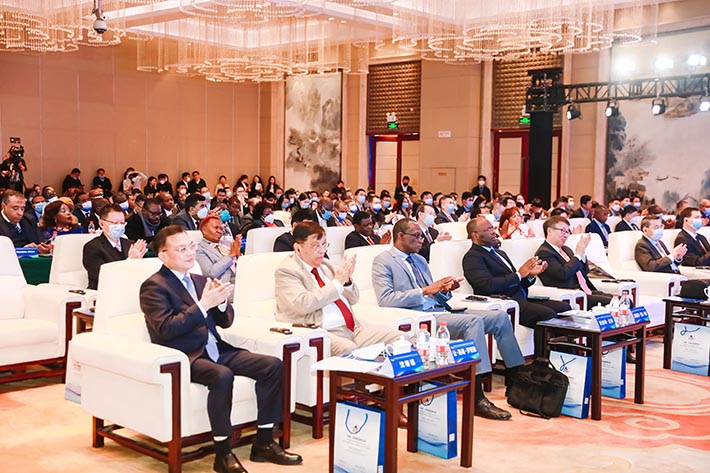|
||||||||||
| Home Nation World Business Opinion Lifestyle ChinAfrica Multimedia Columnists Documents Special Reports |
|
||||||||||
| Home Nation World Business Opinion Lifestyle ChinAfrica Multimedia Columnists Documents Special Reports |
| ChinAfrica |
| Advancing Exchanges |
| China-Africa Economic and Trade Expo propels closer economic partnership |
| By Ehizuelen Michael Mitchell Omoruyi | VOL. 15 July 2023 ·2023-06-25 |

A Rwandan exhibitor showcases dry chilli at the second CAETE in Changsha, Hunan Province, on 27 September 2021 (CNS)
For much of the past 20 years, the Chinese economic engagement with Africa could be summarised in two words: investment and trade. During this period, China’s trade figures with African nations have been remarkable. For instance, in 2022, China-Africa trade surged to a record high of $282 billion, highlighting how China’s business cooperation with the continent of Africa continues to rise.
Statistics from the General Administration of Customs of China show that in the first four months of 2023, rising commodity prices and China’s drive to promote imports from Africa pushed trade up to 648.25 billion yuan ($90.73 billion), an increase of 17.5 percent compared to the same period in 2022. From 1 January to 30 April, exports from China to Africa rose by 36.9 percent year on year to reach 404.71 billion yuan ($56.65 billion). Meanwhile, imports from Africa stood at 243.54 billion yuan ($34.08 billion), down 4.9 percent.
Based on this fact, currently, numerous African nations believe that they must bolster exports to China. In recognition of the necessity and efforts to address the trade imbalance, or at least stop it from getting worse, the Chinese government not only allowed dozens of African nations to commence exporting some goods duty-free, but also announced eight major initiatives at the 2018 Beijing Summit of the Forum on China-Africa Cooperation (FOCAC).
Easier access to market
The eight major initiatives gave birth to the China-Africa Economic and Trade Expo (CAETE).
The third edition of the CAETE, with the theme of Common Development for a Shared Future, will be held in Changsha, Hunan Province, from 29 June to 2 July 2023. Guided by the spirit of FOCAC, the expo intends to bring together a host of participants from China and African nations to discuss the current and future landscape of trade and investment.
The expo is committed to becoming a novel mechanism for China-Africa economic and trade cooperation, a novel platform for the implementation of the economic and trade initiatives under FOCAC, and a novel window for China-Africa economic and trade cooperation at the provincial and local levels. In addition to the initiatives that gave birth to CAETE, the duty-free policy covers more than 8,800 commodities, with China aiming to raise imports from Africa to $300 billion by the end of 2024. Improved revenue will bolster state revenue in African exporters like Angola and Zambia.
The CAETE presents an opportunity to test the stamina of African nations and China, creative capability, and innovative acumen to add value to products. The CAETE is a demonstration of China’s strong belief that win-win and mutually beneficial cooperation, economic and trade cooperation, support for trade liberalisation, support for multilateralism against unilateralism, and economic globalisation are the right ways to achieve shared prosperity.
As a result, the CAETE should be viewed as a “vital vehicle” carrying all nations involved along with the aim of growing international trade, bolstering international confidence, accelerating shared economic prosperity, as well as injecting economic vitality into African nations and the Chinese economy. All of these make the CAETE larger in scale, better in quality, and more innovative, covering diverse areas such as manufacturing, trade, services, e-commerce, and cross-border platforms.
The CAETE is a major mechanism for China to push for a new round of high-level opening up. Therefore, numerous high-quality products and services that will be introduced into China through the expo not only meet the market demand for upgrading consumption and expanding imports to China, but provide an avenue not only for African nations but also for the rest of the world to share the opportunities presented by China’s development and promote cooperation.
The expo is an important signal not just to African nations, but also to the whole world that China remains open for business in spite of the mounting wave of trade protectionism. China should be applauded for advocating rule-based international trade, as the CAETE is a great way to enhance not only China-Africa cooperation but the global relationship as well.
Therefore, with cooperative partners such as the World Trade Organisation, the United Nations Conference on Trade and Development, the United Nations Industrial Development Organisation, the United Nations Development Programme, the Food and Agriculture Organisation of the United Nations, and the International Trade Centre, the CAETE can genuinely provide a channel not only for China-Africa cooperation but also to the rest of the world amid the current trade tension among major economies.

Attendees participate in a promotion conference for CAETE held inBeijing on 16 March (CAETE OFFICIAL WEBSITE)
Balancing trade
For African nations, the CAETE presents a better opportunity to redress the so-called trade imbalance because Africa will start exporting both raw and finished products to China and that is the win-win scenario African nations have been clamouring for.
Africa has become the fastest urbanising region in the world and China has placed itself at vanguard of the infrastructure development. As such, according to the IMF, in 2017, Africa boasted seven of the 20 fastest-growing economies globally. As a way of supporting Africa to sustain this, in 2022, China deepened its cooperation with Africa through mechanisms such as FOCAC, the China International Import Expo, and the Belt and Road Initiative (BRI), an initiative China is using to close Africa’s infrastructure gap.
The Chinese government has announced a $1 billion Belt and Road Africa Fund for infrastructure development, making China a central player in Africa’s infrastructure push. Based on China’s desire to close Africa’s infrastructure gap, a number of the BRI-related projects have been launched or completed. These include the building of a coastal railway line in Nigeria, the Bagamoyo Port in Tanzania, mining infrastructure in the Democratic Republic of the Congo, the Chad-Sudan Railway and the Mphanda Nkuwa Dam.
This is China’s own way of reaching out to the heart of African nations with Chinese firms’ active involvement in building ports, roads, and railways that will underpin integration and trade among African nations - as reflected by the establishment of the landmark African Continental Free Trade Area (AfCFTA). With the introduction of the AfCFTA, Africa-China trade received a significant boost. Chinese firms have been gigantic investors in the continent of Africa and they are presently set to benefit from this by using the AfCFTA deal to significantly boost exports back to China. This has enriched China-Africa cooperation.
Today, through the CAETE, China has provided a guaranteed market for African value-added products that will help African governments to draw more investment and boost exports, not just of minerals and natural resources, but of finished products, which is a sustainable way to create wealth and reduce poverty in Africa. China is willing to use the CAETE as an opportunity to work with the rest of the world to build an open and mutually beneficial world economy, share its development dividend and opportunities, and make greater contributions to building a community with a shared future for mankind.
The author is executive director of the Centre for Nigerian Studies, Institute of African Studies at Zhejiang Normal University
| About Us | Contact Us | Advertise with Us | Subscribe |
| Copyright Beijing Review All rights reserved 京ICP备08005356号-5 京公网安备110102005860号 |